 | 1976 End of an Era |  |
 |  |  |  |  |
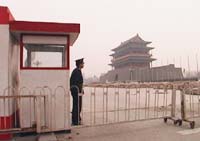 |  |
Tiananmen Square |
|
On January 12, Premier Zhou Enlai dies of cancer. On April 5, thousands of Beijing citizens gather in Tiananmen Square to commemorate him and to voice their opposition to the radical group led by Mao's wife, Jiang Qing. The group, called "The Gang of Four," is blamed for the worst excesses of the Cultural Revolution. The incident becomes known as the Tiananmen Square Incident or the April 5th Movement. |
 |
Purged Party members begin to be rehabilitated and senior leader Deng Xiaoping comes back to Beijing and helps initiate small reforms. |
 |
On September 9, Mao Zedong passes away. Hua Guofeng, Mao's handpicked successor, becomes the chairman of the Party and acting premier. Soon after, he arrests the Gang of Four. |
 |
 |  |  |
 |
 | 1977 The Beginning of Reform |  |
 |
|
Deng Xiaoping works behind the scenes to wrest power from Hua Guofeng. He moves to exonerate millions attacked during the Cultural Revolution. He puts economic prosperity before socialist purity, and maintains belief in the absolute authority of the Party. |
 | 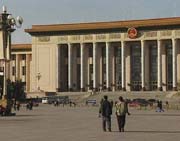 |
Great Hall of the People, Beijing | |
 |
Millions of young people return home from the countryside after they were "sent down" to learn from peasants in the late 1960s and early 1970s. |
 |
In December, Deng chairs the Third Plenum of the Eleventh National Party Congress Central Committee, which renounces the rural policy of the 1960s. His speech signals a shift in economic policy. |
 |
 |  |  |
 |
 | 1978-79 Sweeping Changes |  |
 |
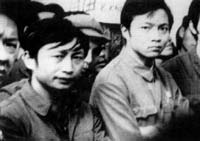 |  |
Protesters at Democracy Wall | |
Deng Xiaoping becomes China's paramount leader and outlines an ambitious program for economic reform. It includes dismantling the Maoist communes and allowing peasants to produce food for private sale, the "household responsibility system." |
 |
The economy is liberalized, but without political freedom. Open-door trade and investment policies are introduced, and Special Economic Zones along the coast are set up for foreign investment. |
 |
Deng negotiates full diplomatic relations with Washington and becomes the first official of the People's Republic of China to visit the U.S. |
 |
In Beijing, Democracy Wall gives people an outlet to criticize the Cultural Revolution, but when it threatens the Communist Party's authority, Deng ends it abruptly. Dozens of people are arrested, including Wei Jingsheng, the editor of an outspoken underground journal. Wei, who is sentenced to 15 years in prison for publishing counterrevolutionary materials, will go on to become one of the country's leading dissidents. (After being released from prison briefly in 1993, Wei finally wins his freedom in 1997.) |
 |
A one-child policy is adopted in 1979, with forced contraceptive use and abortions. |
 |
 |  |  |
 |
 | 1980-82 Socialism With Chinese Characteristics |  |
 |
After a month-long nationally televised trial, the Gang of Four is found guilty. Mao's widow receives a death sentence, later commuted to life imprisonment. |
 | 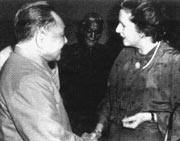 |
Deng Xiaoping with Margaret Thatcher | |
 |
Economic reformers Hu Yaobang and Zhao Ziyang work openly to liberalize the economy. Special Economic Zones in the south allow China to accept foreign capital and adopt foreign technologies in controlled phases. Massive construction projects and the prospect of higher wages lure people from all over China, who stream to coastal cities. |
 |
In the countryside, peasants earn more than they ever dreamed and buy televisions, fans, and refrigerators. The first markets in decades open to sell surplus produce. |
 |
In his speech opening the Twelfth National Congress, Deng describes China's new political system, saying, "We must integrate the universal truth of Marxism with the concrete realities of China, blaze a path of our own and build a socialism with Chinese characteristics." |
 |
Deng hosts British Prime Minister Margaret Thatcher and negotiates the return of Hong Kong to Chinese rule. |
 |
 |  |  |
 |
 | 1983 Anti-Spiritual Pollution Campaign |  |
 |
As social controls loosen, there is an increase in smuggling, profiteering, prostitution, and pornography. Party conservatives rail against these negative consequences of the reforms as well as anti-Marxist ideas such as democracy and freedom of speech. Confronting a potentially serious conservative backlash, Deng appeases them with a short-lived campaign against "spiritual pollution." |
 |
 |  |  |
 |
 | 1984 'To Get Rich is Glorious' |  |
 |
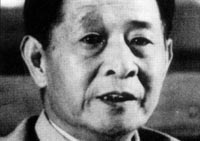 |  |
Hu Yaobang | |
The Joint Declaration is signed, which details the agreement between China and Britain that governs the return of Hong Kong to Chinese rule in 1997. It also signals China's growing power on the world stage. |
 |
After the Anti-Spiritual Pollution Campaign is aborted, reformers, led by Hu Yaobang, push ahead on a variety of economic reforms. |
 |
In the summer, restrictions on private entrepreneurship are greatly relaxed. Political ideological campaigns are put aside and the media instead stress the need for further economic reforms. In the same year, Deng's comment that "to get rich is glorious" spreads out as a popular reform slogan all over the country. |
 |
 |  |  |
 |
 | 1986 Public Enthusiasm for Reform Diminishes |  |
 |
Reform-related stresses begin to plague urban China. In early 1986, only 29 percent of urban residents feel that reform provides equal opportunities for all. A mounting mood of malaise and alienation, and a sharp rise in the urban crime rate, soaring inflation, and corruption, contribute to public dissatisfaction. |
 |
On college campuses, "Cultural Fever" encourages freedom of expression, and students demonstrate for more say in their futures. In Anhui province there is sporadic student unrest. |
 |
Reformers try to address problems of the failing state-owned factories, but are resisted by conservatives like Chen Yun, who view the state sector as the backbone of the socialist system. Millions of workers worry about keeping their "iron rice bowl" of lifetime security. |
 |
Planning begins for Three Gorges Dam, which will be the largest hydroelectric dam in the world. It will displace nearly 1.9 million people, cost between $20 billion and $100 billion, and cause a wide range of environmental damage. Officials say it will control the Yangtze, which often floods and kills thousands, and will generate a ninth of China's power. |
 |
China's population reaches 1.2 billion. |
 |
 |  |  |
 |
 | 1987 Zhao's New Reform Blueprint |  |
 |
The new Party chief, reformer Zhao Ziyang, calls for the separation of the Party and government, the strengthening of the socialist legal system, and establishing a dialogue between the Party and the people. |
 |
Rural unemployment increases as factories cannot absorb everyone freed from collective farming. |
 |
The economy enters a period of high-speed growth, with rampant inflation and corruption. |
 |
 |  |  |
 |
 | 1989 The Tiananmen Crackdown |  |
 |
From 1987 to 1989, China's urban malaise worsens. Inflation, corruption, and unemployment deepen the mood of discontent. |
 |
On April 15, liberal-minded former Party Chief Hu Yaobang dies of a heart attack. The next day, several hundred students from Beijing universities march to Tiananmen Square to lay memorial wreaths. An estimated 100,000 people eventually join them in the square. |
 |
Workers also join the protest and it continues through the historic visit of Soviet leader Mikhail Gorbachev, who has come to Beijing to mend a 30-year rift between China and the U.S.S.R. Deng Xiaoping and hardliners see the protest as a threat to their rule and on May 20, the government declares martial law. |
 |
On June 24, Party General Secretary Zhao Ziyang, who shows sympathy with the students, is dismissed from his post. The same day, Deng orders the People's Liberation Army (PLA) to retake Tiananmen Square. The army opens fire on civilians, killing hundreds. Thousands of demonstrators are imprisoned. |
 |
Jiang Zemin succeeds Zhao Ziyang as general secretary of the Chinese Communist Party; his ascendance initiates the third generation of leadership. |
 |
Political reform is brought to a virtual standstill. |
 |
 |  |  |
 |
 | 1990 Reform at a Crossroads |  |
 |
In the immediate aftermath of the Tiananmen crackdown, China finds itself isolated from the West. |
 |
The government carries out an austerity campaign so drastic that industrial growth in the first quarter of the year is nearly zero, leaving economic reforms stranded. |
 |
The U.S. suspends China's "most favored nation" status. When the World Bank resumes loans to China in July, it is the first signal that the country is beginning to regain its financial footing. |
 |
 |  |  |
 |
 | 1991 Reforms Stalled |  |
 |
After the fall of the Soviet Union and former communist states in Eastern Europe, Party conservatives redouble efforts to attack liberalism and raise doubts about capitalism. The pace of economic reforms slows conspicuously. |
 |
 |  |  |
 |
 | 1992 Deng's Southern Tour |  |
 |
While maintaining strict political control, China's leaders launch their most spectacular period of economic growth. Deng Xiaoping travels to the Special Economic Zones and calls on the country to copy their example. He declares that "communism will not be saved by rhetoric but by improving people's living standards." |
 | 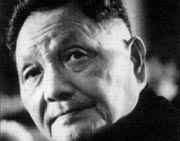 |
Deng Xiaoping | |
 |
Foreign investors return, and China produces its first millionaires. The Shanghai Stock Exchange is allowed to open, although it is described as an experiment. The Shenzhen exchange follows soon after. The economy hits a new high. The boom continues, signaling the failure of the Party conservatives' opposition. The International Monetary Fund (IMF) ranks China's economy as the world's third largest, after those of the U.S. and Japan. |
 |
But state-owned factories lose money and drain capital from the state budget. Foreign companies do not invest inland, creating large income disparity between coastal regions and the rest of China. |
 |
 |  |  |
 |
 | 1994 Jiang Reaffirmed |  |
 |
Deng appears in public for the last time. |
 |
In September, the Fourth Plenum of the Fourteenth National Party Congress is held in Beijing and Jiang Zemin's position as China's new leader is reaffirmed, along with Deng's policy of "socialism with Chinese characteristics." |
 |
China abolishes the Renminbi -- know as "the people's currency" -- and fixes its first floating rate in nearly 50 years. |
 |
 |  |  |
 |
 | 1997 Deng Dies |  |
 |
Deng Xiaoping dies of respiratory failure at the age of 93. |
 |
Hong Kong is handed back to China on July 1 after 150 years of British colonial rule; Beijing inherits one of the world's most vibrant capitalist economies and an international financial center. |
 |
The Chinese Communist Party focuses on maintaining internal stability and economic growth, projecting itself forward into global organizations, and preventing Taiwan's permanent separation from China. |
 |
 |  |  |
 |
 | 1998 Coping with the Asian Financial Crisis |  |
 |
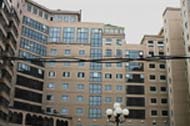 |  |
Private housing compound in Beijing |
|
Chinese leaders watch anxiously as the Asian financial crisis cripples neighboring economies. China's banking system, overwhelmed with bad loans to the nation's state-owned companies, is on the verge of collapse. |
 |
Zhu Rongji, who succeeds Li Peng as premier, announces his economic reforms in March: thousands of state-owned companies will be restructured, and millions of workers will be laid off. In addition, nearly 4 million civil service jobs are eliminated. |
 |
|
In June, the government announces city housing reform, which promotes the idea of private property ownership by encouraging residents to buy houses previously assigned to them by the government. The initiative is billed as a means of combating the Asian financial crisis. |
 |
 |  |  |
 |
 | 1999 Milestone Anniversary |  |
 |
China now has the fastest growing economy in the world, with 1.25 billion people and a GDP of $3,800 per capita. It also has the second largest economy after the U.S. But it remains a poor country and lacks monetary and fiscal controls to manage efficiently the vast economy. |
 | 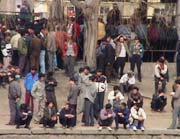 |
A labor market in Shenyang |
|
 |
As urban unemployment increases, millions of peasants or migrant workers continue to flock to the cities in search of work. |
 |
On October 1, the Communist Party celebrates its 50th year in power. |
 |
 |  |  |
 |
 | 2000 The War on Corruption |  |
 |
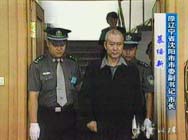 |  |
Shenyang's Mayor Mu in custody |
|
Official government corruption is a major complaint of ordinary people. Huge scandals in Xiamen, Shenyang, and Beijing expose rampant corruption at all levels of political life. Cheng Kejie, the former vice chairman of the National People's Congress who was accused of amassing more than $5 million through corruption, is executed. His execution signals an intensified campaign against official corruption. |
 |
 |  |  |
 |
 | 2001 China Joins the WTO |  |
 |
The deadline to reform the state-owned industries passes, but many are still struggling unprofitably along. | 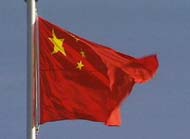 |
 |
More than 34 million workers have been laid off. The government must create 17 million new jobs to maintain its current official unemployment rate of 10 percent. But analysts say unemployment figures in China are seriously under-reported. |
 |
China is selected to host the 2008 Olympic Games. |
 |
|
In November, after a tumultuous 15-year battle, China officially becomes a member of the World Trade Organization. But inside China, the debate continues between those who consider the WTO part of the web of institutions designed to strengthen Western control over the developing world, and those who are more welcoming of globalization. China's entry is expected to boost the economic reforms started 20 years earlier and to open its huge market to the rest of the world. |
 |
 |  |  |
 |
 | 2002-2003 New Leadership Emerges |  |
 |
Prime Minister Zhu Rongji, widely considered the architect of China's economic successes, steps down. |
 |
Vice President Hu Jintao succeeds Jiang Zemin as general secretary of the Chinese Communist Party. Jiang also says he will relinquish his post as China's president in March 2003. |
 |  |  |